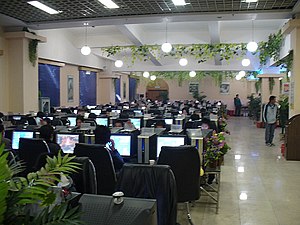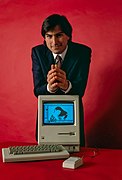The Internet PortalThe Internet (or internet) is the global system of interconnected computer networks that uses the Internet protocol suite (TCP/IP) to communicate between networks and devices. It is a network of networks that consists of private, public, academic, business, and government networks of local to global scope, linked by a broad array of electronic, wireless, and optical networking technologies. The Internet carries a vast range of information resources and services, such as the interlinked hypertext documents and applications of the World Wide Web (WWW), electronic mail, telephony, and file sharing. The origins of the Internet date back to research that enabled the time-sharing of computer resources and the development of packet switching in the 1960s. The set of rules (communication protocols) to enable internetworking on the Internet arose from research and development commissioned in the 1970s by the Defense Advanced Research Projects Agency (DARPA) of the United States Department of Defense in collaboration with universities and researchers across the United States and in the United Kingdom and France. The ARPANET initially served as a backbone for the interconnection of regional academic and military networks in the United States to enable resource sharing. The funding of the National Science Foundation Network as a new backbone in the 1980s, as well as private funding for other commercial extensions, encouraged worldwide participation in the development of new networking technologies and the merger of many networks using DARPA's Internet protocol suite. The linking of commercial networks and enterprises by the early 1990s, as well as the advent of the World Wide Web, marked the beginning of the transition to the modern Internet, and generated sustained exponential growth as generations of institutional, personal, and mobile computers were connected to the network. Although the Internet was widely used by academia in the 1980s, the subsequent commercialization in the 1990s and beyond incorporated its services and technologies into virtually every aspect of modern life. (Full article...) Selected articleGoogle Inc. is an American public corporation, specializing in Internet search and online advertising. The company is based in Mountain View, California, and has 15,916 full-time employees (as of September 30, 2007). Google was co-founded by Larry Page and Sergey Brin while they were students at Stanford University and the company was first incorporated as a privately held company on September 7, 1998. Google's initial public offering took place on August 19, 2004, raising US$1.67 billion, making it worth US$23 billion. Through a series of new product developments, acquisitions and partnerships, the company has expanded its initial search and advertising business into other areas, including web-based email, online mapping, office productivity, and video sharing, among others. In 2006, "google" came in second on Merriam-Webster's Words of the Year. Google has more products than any one employee can tell you. They also have a full warehouse of servers. Selected picture An internet café or cybercafé is a place where one can use a computer with Internet access, most for a fee, usually per hour or minute; sometimes one can have unmetered access with a pass for a day or month, etc. It may serve as a regular café as well, with food and drinks being served. News
Wikinews Internet portal
WikiProjects
Did you know (auto-generated) -
Selected biography
Vinton Gray Cerf (born June 23, 1943) is an American computer scientist who is the "person most often called 'the father of the Internet'." His contributions have been recognized repeatedly, with honorary degrees and awards that include the National Medal of Technology, the Turing Award, and the Presidential Medal of Freedom. Cerf's first job after getting his B.S. in mathematics from Stanford University was at IBM, where he worked for less than two years as a systems engineer supporting QUIKTRAN. He left IBM to become a principal programmer at UCLA; he then became an assistant professor at Stanford University where he co-designed the Department of Defense TCP/IP protocol suite with Robert E. Kahn. Cerf joined the board of the Internet Corporation for Assigned Names and Numbers (ICANN) in 1999, and is serving a term until the end of 2007; he previously served as the ICANN Chair.
General images -The following are images from various internet-related articles on Wikipedia.
Selected quoteMore Did you know...
Main topics
Featured contentCategoriesRelated portalsThings you can do
Associated WikimediaThe following Wikimedia Foundation sister projects provide more on this subject:
Wikipedia's portalsDiscover Wikipedia using portals |
How Can We Help?























































Recent Comments